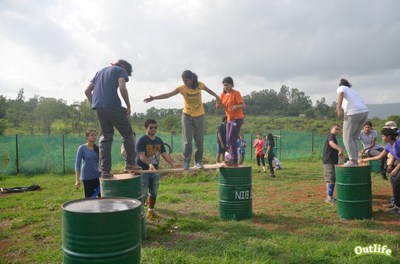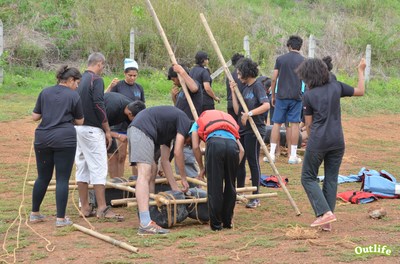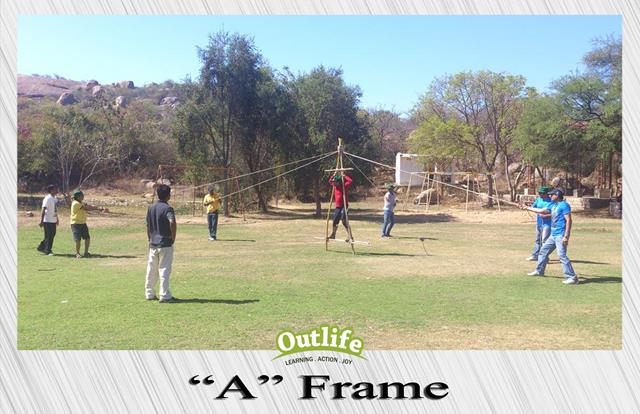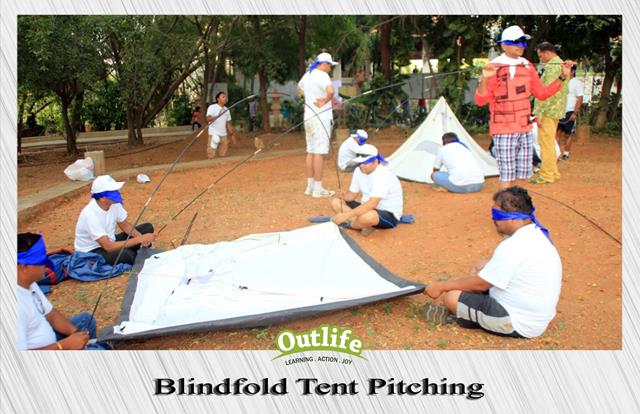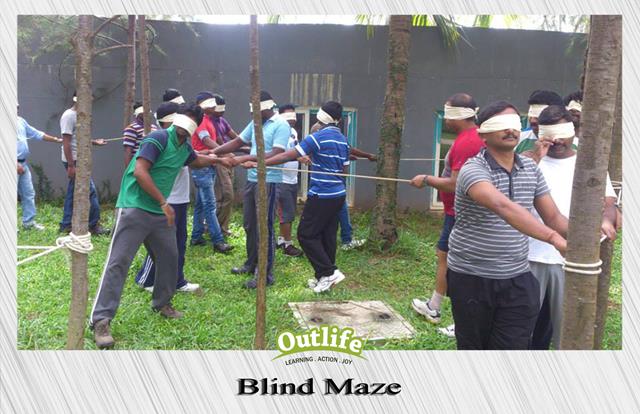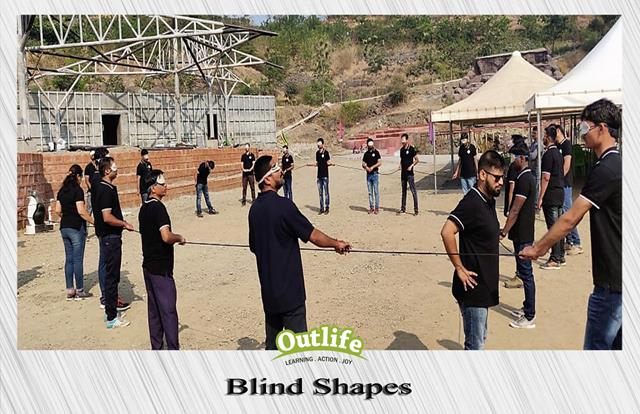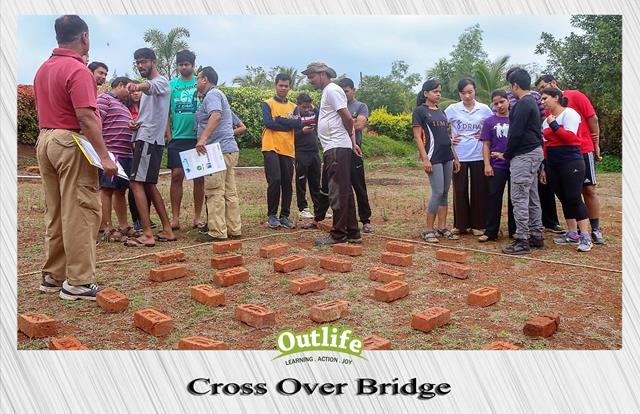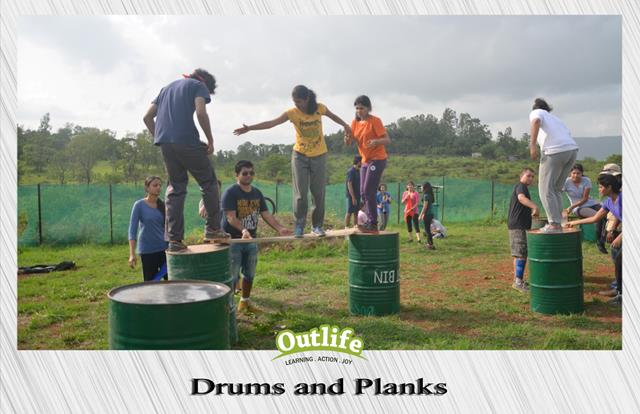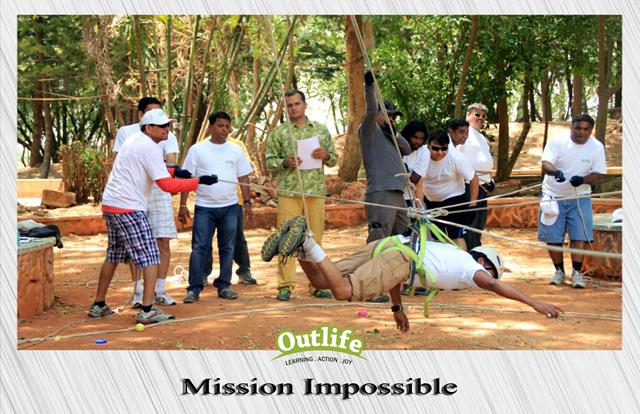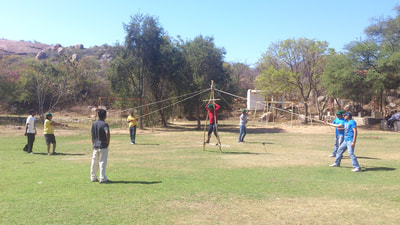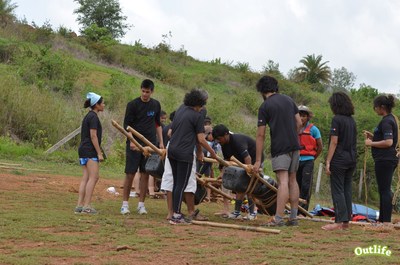Corporate Outbound Training
|
Outbound training - also known as OBT Training - is an innovative approach to team building and personal development that utilises experiential learning, outdoor activities and adventure sports. By engaging in actual experience-based activities, individuals and teams can develop greater understanding of themselves, their motivations, and how they interact within their team environments.
Corporate Outbound Training - OBT Training or Outbound Learning OBL is an evidence-based effective training method for enhancing employee and team behaviors and organizational performance through participation in outdoor activities and experiential learning methodology.
Outbound Training generally revolves around outbound activities designed to improve leadership, communication skills, performance, planning, change management, delegation, teamwork, and motivation. The participants are engaged in outbound training activities that are immersive and real-time. These outbound learning experiences create opportunities for various understandings and insights to be generated for the participants based on their learning needs and desired outcomes What is Outbound Training?Outbound Training is a training and facilitation methodology used to enhance the effectiveness and performance of employees through use of Experiential Learning Activities and Games and Adult Learning Principles.
The approach is based on Outward Bound method of group development through outdoor and wilderness learning expeditions that focus on tackling challenging scenarios in the outdoors that involve problem solving, decision making, communications, and risk taking, where participants develop the ability to adapt, grow and succeed as teams. In an Outbound Training program the participants are divided into teams and assigned tasks or activities for completion in a specified time. The facilitator invites the group to achieve a goal, but does not explain how to successfully complete the activity. Participants take part in outbound training games and must work to find a solution individually and together as a team, and must communicate, collaborate and learn from each other in order to be successful. The Learning begins with the experience followed by reflection, discussion, analysis and evaluation of the experience and taking the newly formed concepts and ideas back to the workplace. Outlife is one among the leading outbound training companies in India with over a decade of OBT training experience. Outlife strongly delivers impactful corporate outbound training programs that can be the key element of developing a tight knit, effective and high performance teams for any organisation. |
Request Callback
Outbound Training Proposals
| ||||||||||||
How is Outbound Training Conducted?
Outbound Training - OBT is a training methodology based on experiential learning and adult learning principles conducted primarily in an outdoor environment away from familiar settings like a trip to a green countryside with natural terrain, trees, rocks and hills.
Outbound Training includes variety of learning experiences in form of games and activities that include a mix of outdoors, adventure, team building and management games delivered in a offsite environment by a certified outbound facilitator.
Outbound Training involves an informal environment, surrounded by nature and tranquility, people become more natural and reflective, paving the way for a complete and effective learning process.
Achievement, performance and behaviors during outbound training games are reviewed through a process of discussion called debriefing, to identify behaviors that enhance performance or lead to failure or decreased performance.
Strategies are formulated to deal with factors that hinder, and these strategies are then put to use in the activities that follow, to test their effectiveness and ultimately help the participants learn to change behaviors or processes back at work.
Read Our Blog Post on how to plan an outbound training program for your company
Learning more on Outbound Training at
https://businessjargons.com/outbound-training.html
Outbound Training includes variety of learning experiences in form of games and activities that include a mix of outdoors, adventure, team building and management games delivered in a offsite environment by a certified outbound facilitator.
Outbound Training involves an informal environment, surrounded by nature and tranquility, people become more natural and reflective, paving the way for a complete and effective learning process.
Achievement, performance and behaviors during outbound training games are reviewed through a process of discussion called debriefing, to identify behaviors that enhance performance or lead to failure or decreased performance.
Strategies are formulated to deal with factors that hinder, and these strategies are then put to use in the activities that follow, to test their effectiveness and ultimately help the participants learn to change behaviors or processes back at work.
Read Our Blog Post on how to plan an outbound training program for your company
Learning more on Outbound Training at
https://businessjargons.com/outbound-training.html
Why is Outbound Training required.
The main focus with the Outbound Training approach is to impart learning on individual, team and organizational needs such as Leadership, Strategic Thinking, Conflict Management, Team Building, Effective Communication, Quality Improvement, Mentoring and Skill Development.
Outbound Training is a evidence based behavioral intervention that is effective in enhancing employee and team performance for over 4 decades and is grounded in the principles of experiential land adult learning.
For many corporate executives outbound training tends to be the most sort after training intervention where they will be able to experience, reflect, learn and improve their learning and performance that is desired to enhance both personal and professional life.
Outbound Training is a evidence based behavioral intervention that is effective in enhancing employee and team performance for over 4 decades and is grounded in the principles of experiential land adult learning.
For many corporate executives outbound training tends to be the most sort after training intervention where they will be able to experience, reflect, learn and improve their learning and performance that is desired to enhance both personal and professional life.
What are some Outbound Training Activities
Outbound Training Activities include a mix of adventure, outdoors and group development exercises and simulations that are designed as challenges for the team to plan, strategize and work together to simulate circumstances and behaviors found at the workplace, allowing for insightful moments of personal change and team discovery that can be carried to the workplace. The outbound activities are designed to engage the participants physically, emotionally, intellectually and socially.
Outbound training activities are largely conducted in outdoor locations away from familiar environments like parks, retreat centers, resorts or the wilderness. Outdoor and Adventure activities include rappelling, rock climbing, low and high ropes courses, river crossing, white water rafting and other allied adventure activities.
Mental & Communication Challenges:
Outdoor Team Activities:
Physical & Adventurous Activities:
Collaborative Outbound Activities:
Water-Based Activities:
Nature-Based Activities:
For a list of Outbound Adventure Activities check Adventure Activities
Group Development include team challenges where the group works as a single unit or competes to overcome a challenge by displaying their leadership, problem solving, communication and teamwork skills.
For a list of group activities check Top 10 Corporate Team Building Activities
Outbound training activities are largely conducted in outdoor locations away from familiar environments like parks, retreat centers, resorts or the wilderness. Outdoor and Adventure activities include rappelling, rock climbing, low and high ropes courses, river crossing, white water rafting and other allied adventure activities.
Mental & Communication Challenges:
- Blind Trust Walk is a great team activity that helps enhance trust and leadership in groups
- Duct Tape Walk: Navigate a course blindfolded, relying on teammates' instructions.
- Mission Impossible: Complete a series of challenges using teamwork and problem-solving.
- Scavenger Hunt: Uncover hidden clues and work together to find them, encouraging exploration and collaboration.
- The Human Knot: Untangle yourselves as a human knot, promoting communication and critical thinking.
Outdoor Team Activities:
- Drums and Planks: Create music together using drums and planks, fostering creativity and group coordination.
- A Frame: Conquer a giant A-shaped structure together, fostering trust and communication.
- The Amazing Race: Compete in teams to complete a series of physical and mental challenges.
- Paintball: Engage in a strategic combat game, promoting teamwork and problem-solving under pressure.
- Relay Race: Run, jump, and work together as a team in a classic relay competition.
- Capture the Flag: Divide into teams and strategize to capture the opposing team's flag, promoting agility and teamwork.
- Flag Football: Enjoy a friendly game of football with modified rules, promoting teamwork and sportsmanship.
- Bicycle Building Challenge: Build a functional bike from scratch using teamwork and creativity.
- Trust Track: Fall backwards safely into your teammates' arms, building trust and overcoming fear.
Physical & Adventurous Activities:
- High Ropes Courses: Participants navigate through a series of elevated obstacles, challenging their physical and mental abilities while fostering trust and teamwork.
- Rock Climbing and Rappelling: These activities help individuals conquer their fears, build confidence, and develop problem-solving skills.
- Obstacle Courses: Teams work together to overcome a series of physical and mental challenges, promoting collaboration and communication .
- Survival Skills Workshops: Participants learn essential skills such as fire-making, shelter-building, and navigation, fostering self-reliance and resilience.
- Outdoor Rope Course: Navigate a series of obstacles high in the trees, building confidence and overcoming fears.
- Zip Line: Soar through the trees on a zip line, enjoying an adrenaline rush and scenic views.
- Commando Net: Work together to climb a massive net structure, promoting teamwork and problem-solving.
Collaborative Outbound Activities:
- Human Centipede Walk: Race as a connected human centipede, emphasizing communication and coordination.
- Crossover Bridge: Work together to build a bridge for your team to cross, fostering coordination and planning.
Water-Based Activities:
- Raft Building: Participants construct rafts using limited resources, enhancing resource management and adaptability in dynamic environments. Raft Building is a team building activity that tests teams ways of planning, strategy, collaboration and execution.
- Kayaking and River Crossing: Water-based activities that encourage teamwork, decision-making, and risk assessment..
- River Crossing and White Water Rafting: Navigate a river together, building teamwork and communication in a challenging environment.
Nature-Based Activities:
- Trekking and Hiking: Explore the outdoors together, promoting teamwork and appreciation for nature.
- Camping and Bonfire: Bond under the stars with a classic camping experience.
- Nature Walks and Birdwatching: Connect with nature and enjoy a relaxing group activity.
- Wilderness Survival: Learn basic survival skills and work together to overcome challenges.
- Wilderness Treks: Teams embark on guided treks through natural environments, promoting leadership, decision-making, and problem-solving skills.
For a list of Outbound Adventure Activities check Adventure Activities
Group Development include team challenges where the group works as a single unit or competes to overcome a challenge by displaying their leadership, problem solving, communication and teamwork skills.
For a list of group activities check Top 10 Corporate Team Building Activities
Outbound Training Methodology
The outbound facilitation methods uses structured experiential learning cycle which includes various stages such as
1. Experiencing/doing
2. Reviewing and reflecting on the experience
3. Drawing learning from the reflection
4. Applying and testing the learning through active experimentation
5. Reviewing and reflecting on the active experimentation
1. Experiencing/doing
2. Reviewing and reflecting on the experience
3. Drawing learning from the reflection
4. Applying and testing the learning through active experimentation
5. Reviewing and reflecting on the active experimentation
Learning is the process whereby knowledge is created through the transformation of experience - David Kolb
Benefits of Outbound Training
Outbound programs have been found to be effective to enhance self development, social and emotional development, teamwork and leadership. Other areas include behavior change and personal efficiency.
After spending a time outdoors, team members tend to bond together in a way that is not possible concrete office environment.
Outbound programs demonstrate that people can become more cohesive, shedding their inhibitions, opening up and becoming more receptive to learning.
It also proves that in spite of differences in cultures and ethnic backgrounds, people can live and work together and that it is inherent in human nature to be helpful.
In an environment such as this, it becomes possible for a sensitive and experienced executive coach or facilitator to identify weaknesses, strengths and suggest new coping behavior for trouble areas.
After spending a time outdoors, team members tend to bond together in a way that is not possible concrete office environment.
Outbound programs demonstrate that people can become more cohesive, shedding their inhibitions, opening up and becoming more receptive to learning.
It also proves that in spite of differences in cultures and ethnic backgrounds, people can live and work together and that it is inherent in human nature to be helpful.
In an environment such as this, it becomes possible for a sensitive and experienced executive coach or facilitator to identify weaknesses, strengths and suggest new coping behavior for trouble areas.
Outbound Training Outcomes
Teams that learn together using our outbound training process are found to benefit from:
- Three times more effective than regular teams.
- Develop Courage and take up calculated risks as a team.
- Are more responsive and adaptive at dealing with highly complex work challenges
- Can impact team performance by up-to 30%
- Improve on individual, team and organizational learning and performance
- Harness conflict, cooperate and are more inclusive with each other.
- Develop Trust, Belonging and Value deep diversity and interdependence among team members
- Share a common team purpose that allows them to deliver better, faster, more sustainable project results
Impact of Outbound Training
Companies invest significantly in employee training, with American companies allocating 12% of their annual budget for employees' learning and development and Indian companies increasing their L&D budgets by 24.7% compared to the previous year. This investment is made with the expectation of substantial returns on investment (ROI).
The long-term impact of Outbound Training (OBT) is evident in the workplace, where employees apply lessons learned in OBT to real-life situations, leading to improved performance and a positive ROI. Outbound training interventions are designed to enhance behavioral outcomes, performance, and change through outdoor, adventure, and group development activities.
The long-term impact of Outbound Training (OBT) is evident in the workplace, where employees apply lessons learned in OBT to real-life situations, leading to improved performance and a positive ROI. Outbound training interventions are designed to enhance behavioral outcomes, performance, and change through outdoor, adventure, and group development activities.
Outbound Learning Techniques
Outbound training adopts a holistic approach to employee development, utilizing outdoor activities as a means to enhance individual and team performance. By exposing participants to immersive and real-time learning experiences tailored to their specific needs and desired outcomes, outbound training facilitates transformative growth and development.
Outbound Learning (OBL), plays a crucial role in fostering personal and professional growth by:
Outbound learning also employs various experiential learning techniques, such as:
By engaging participants in activities that challenge their conventional thinking patterns and encourage them to approach problems from new perspectives, outbound training helps individuals develop the skills necessary to thrive in today's dynamic corporate landscape.
Through carefully designed activities and challenges, outbound training helps individuals develop the leadership skills necessary to drive organizational success and navigate complex business challenges.
By incorporating these innovative techniques, outbound training programs deliver transformative experiences that empower individuals and teams to reach their full potential, fostering a culture of continuous learning, growth, and success.
Outbound Learning (OBL), plays a crucial role in fostering personal and professional growth by:
- Exposing individuals to real-life situations
- Enabling learning from successes and failures
- Focusing on hands-on experiences and practical application.
Outbound learning also employs various experiential learning techniques, such as:
- Role Plays - Simulating real-world scenarios to foster learning and trust
- Scenarios - Presenting challenges that require problem-solving and decision-making
- Group Activities - Encouraging collaboration and teamwork to achieve common goals
- Case Studies - Identifying risks, building problem-solving abilities, and implementing learning in real-time industry environments
- Creative Thinking Skills: Activities like "Duct Tape Walk" and "Scavenger Hunt" encourage unconventional solutions and thinking outside the box.
- Problem Solving Skills: "Mission Impossible" and "The Amazing Race" challenge teams to solve problems collaboratively under pressure.
- Decision Making Skills: "Capture the Flag" and "Relay Races" require quick decisions with limited information, fostering strategic thinking.
- Out of the Box Thinking: "Bicycle Building Challenge" and "Crossover Bridge" push teams to come up with unique solutions using limited resources.
By engaging participants in activities that challenge their conventional thinking patterns and encourage them to approach problems from new perspectives, outbound training helps individuals develop the skills necessary to thrive in today's dynamic corporate landscape.
Through carefully designed activities and challenges, outbound training helps individuals develop the leadership skills necessary to drive organizational success and navigate complex business challenges.
By incorporating these innovative techniques, outbound training programs deliver transformative experiences that empower individuals and teams to reach their full potential, fostering a culture of continuous learning, growth, and success.
Outbound Training Topics
Our areas of expertise in delivering Outbound Training for different work related behavioral skills, leadership and managerial competencies are
|
• Leadership Skills
• Change Management • Giving Feedback • Delegation Skills • Motivation Skills • Creativity & Innovation • Problem Solving • Working in Teams • Team Leadership • Confidence Building • Risk Taking |
• Communication Skills
• Emotional Intelligence • Time Management • Confidence Building • Decision Making • Personal Impact • Assertiveness Skills • Goal Setting • Stress Management • Professional Effectiveness • Overcoming Limiting Beliefs |
• Conflict Management
• Interpersonal Skills • Listening Skills • Persuasion Skills • Team Building • Trust Building • Strategic Thinking • Collaboration • Negotiation Skills • High Performance • Self Development |
Adult Learning Principles in Outbound Training
Adults learn more through experiential learning and trying out concepts in a real world . This is where outbound training incorporates principles of experiential and adult learning into program design and delivery.
Adult Learning principles in Outbound Training Include the following premise:
Adults are self directed and learn better when they are free to direct their own learning to develop new skills.
Adults are self motivated in their approach to learning. It motivates them to know how the learning can help them immediately and how they can apply it in the real world.
Adults prefer learning by doing through participation and practical evaluation. They want to experience to know what works and what doesn't work instead of being told how to do things.
Adults focus on problem solving to find solutions. They seek practical and meaningful ways that include analysis and reflection to support deeper learning.
Adults count on their experiences and knowledge which they can use to prove their competence each time. If prior knowledge and experience does not work for them, it becomes an insight to change their thought process through newer evidence.
Adults prefer to be responsible for choosing ways and processes that benefit them to achieve a particular goal.
Adults value relationships and prefer working environments, where they can feel belonged to . They love participating in collaborative and relationship focused environments.
Adults prefer safe environments where they can feel safe to experiment and learn from mistakes without being judged.
Adults prefer peer to peer learning where they can be respected as equals and exchange information that helps them improve and achieve their goals.
Adults seek personal meaning by choosing options that support meeting their individual needs and purpose. They seek engagement that is relevant and meaningful to them.
Adult Learning principles in Outbound Training Include the following premise:
Adults are self directed and learn better when they are free to direct their own learning to develop new skills.
Adults are self motivated in their approach to learning. It motivates them to know how the learning can help them immediately and how they can apply it in the real world.
Adults prefer learning by doing through participation and practical evaluation. They want to experience to know what works and what doesn't work instead of being told how to do things.
Adults focus on problem solving to find solutions. They seek practical and meaningful ways that include analysis and reflection to support deeper learning.
Adults count on their experiences and knowledge which they can use to prove their competence each time. If prior knowledge and experience does not work for them, it becomes an insight to change their thought process through newer evidence.
Adults prefer to be responsible for choosing ways and processes that benefit them to achieve a particular goal.
Adults value relationships and prefer working environments, where they can feel belonged to . They love participating in collaborative and relationship focused environments.
Adults prefer safe environments where they can feel safe to experiment and learn from mistakes without being judged.
Adults prefer peer to peer learning where they can be respected as equals and exchange information that helps them improve and achieve their goals.
Adults seek personal meaning by choosing options that support meeting their individual needs and purpose. They seek engagement that is relevant and meaningful to them.
Why Partner with Outlife for Outbound Training
- Alignment with Learning Objectives: We ensure that the program's activities are directly aligned with the company's learning objectives, such as leadership development, communication enhancement, or team cohesion.
- Expertise of Facilitators: Our Facilitators are experts in Outbound Traiing. They have a strong background in experiential education and a proven track record in conducting over thousand outbound training obt programs.
- Safety Measures: Comprehensive safety protocols are alway in place, including well-maintained equipment, trained staff, and emergency response strategies.
- Program Design and Demographics: The program is carefully planned, considering the demographics of the participants and the specific outcomes desired from the training.
- Promote Group Work and Collaboration: We Encourage teamwork that allows leaders to understand the strengths and weaknesses of their team members.
- Creative Problem Solving: We Facilitate activities that require creative solutions, enhancing problem-solving skills applicable in the workplace.
- Decision-Making Exercises: We Include exercises that promote group decision-making, translating to improved problem-solving skills in the office.
- We Conduct Structured Debriefing Sessions: After the activities, we hold sessions to discuss experiences, lessons learned, and their application in the workplace.
- Reflect on Key Learnings: We Ensure that the debriefing sessions help participants extract actionable insights that can be applied to enhance workplace dynamics and personal growth.
- Post-Program Support: We offer follow-up support to reinforce the learning and ensure long-term benefits.
Outlifes Achivements in Outbound and Experiential Learning Facilitation
Outlife is a leading provider of experiential learning solutions in India, specializing in Outbound Training, Team Building Activities, and Employee Engagement. They offer a unique blend of outdoor activities, simulations, and workshops that go beyond traditional training methods.
Outlife's hands-on learning approach allows team members to apply their skills, develop new ones, and gain valuable insights into their strengths and weaknesses.
Outlife has a rich history of offering trainings to 1500 plus clients and have offered trainings to 2,00,000 plus participants. Our strong team comprises of Junior and senior facilitators who hold unique certifications in various training methodologies, having a rich experience of more than 15 to 20 years.
Safety is the number one priority for Outlife, with continuous safety measure reviews and certified, experienced trainers and adventure staff. We offer a wide range of experiential programs and services including:
Outlife's Achievements
2750 Outbound training & team building programs conducted
3110 Training man days
2,15,600 Participants engaged
Outlife has worked with prominent clients such as Tata, L&T, Google, Cognizant, Aurobindo, Novartis, HSBC, Tech Mahindra, Deloitte, Amazon, Daimler, TMEIC, Kantar, ADP, Accenture, Pega Systems, TCS, WIPRO, Atlas Copco, ICICI, Zwick, Indian Navy, and Govt of Telangana.
Outlife's hands-on learning approach allows team members to apply their skills, develop new ones, and gain valuable insights into their strengths and weaknesses.
Outlife has a rich history of offering trainings to 1500 plus clients and have offered trainings to 2,00,000 plus participants. Our strong team comprises of Junior and senior facilitators who hold unique certifications in various training methodologies, having a rich experience of more than 15 to 20 years.
Safety is the number one priority for Outlife, with continuous safety measure reviews and certified, experienced trainers and adventure staff. We offer a wide range of experiential programs and services including:
- Team Building Activities
- Employee Engagement
- Management Development
- Leadership Development
- Outbound Training Certification
Outlife's Achievements
2750 Outbound training & team building programs conducted
3110 Training man days
2,15,600 Participants engaged
Outlife has worked with prominent clients such as Tata, L&T, Google, Cognizant, Aurobindo, Novartis, HSBC, Tech Mahindra, Deloitte, Amazon, Daimler, TMEIC, Kantar, ADP, Accenture, Pega Systems, TCS, WIPRO, Atlas Copco, ICICI, Zwick, Indian Navy, and Govt of Telangana.
Expertise in Delivering Outbound Training for over a decade.
As a company that has been in the field of outbound training, experiential learning, and outdoor leadership for over a decade you can be rest assured about our expertise and competence to delier impactful outbound training programs for your organisation.
By partnering with a trusted provider like Outlife, companies can benefit from customized programs that focus on specific areas of development, such as leadership, teamwork, and communication. The carefully designed activities and challenges not only foster personal and professional growth but also contribute to the overall success of the organization.
Investing in employee development through outbound training demonstrates a commitment to their growth and well-being, leading to increased engagement, job satisfaction, and loyalty. As Mumbai continues to be a hub for corporate training, with a wide range of programs and top-notch venues, organizations have the opportunity to transform their teams and drive success in today's dynamic business landscape.
Contact Us to design your outbound training agenda that meets your learning needs and also takes care of serene location that offers variety of outbound learning experiences.
By partnering with a trusted provider like Outlife, companies can benefit from customized programs that focus on specific areas of development, such as leadership, teamwork, and communication. The carefully designed activities and challenges not only foster personal and professional growth but also contribute to the overall success of the organization.
Investing in employee development through outbound training demonstrates a commitment to their growth and well-being, leading to increased engagement, job satisfaction, and loyalty. As Mumbai continues to be a hub for corporate training, with a wide range of programs and top-notch venues, organizations have the opportunity to transform their teams and drive success in today's dynamic business landscape.
Contact Us to design your outbound training agenda that meets your learning needs and also takes care of serene location that offers variety of outbound learning experiences.
Outbound Training Locations in India
The Outbound Training Campsite facilities are specially designed for conducting experiential learning programs with elements of adventure, team building and challenge based learning.
We deliver outbound training in the Indian cities of Ahmedabad, Bangalore, Chennai, Coimbatore, Delhi, Goa, Hyderabad, Kochi, Mumbai, Pune, Kolkata and Vizag
We deliver outbound training in the Indian cities of Ahmedabad, Bangalore, Chennai, Coimbatore, Delhi, Goa, Hyderabad, Kochi, Mumbai, Pune, Kolkata and Vizag
FAQ on Outbound Training
What is outbound training?
Outbound training is a type of experiential learning training workshop that involves engaging individuals in outdoor team activities such as hiking, rock climbing, and team-building exercises. The purpose of outbound training is to develop teamwork, leadership, communication, and problem-solving skills.
What is meant by outbound training?
Outbound Training or OBT is an action and activity-based behavioral training intervention based on experiential learning methodology for employee development. It is a methodology of "learning by doing" and "hands-on experience" and includes outdoor, adventure, and group activities that engage participants to bring out the desired learning outcome.
What is corporate outbound training?
Corporate Outbound Training is an evidence-based effective training method for enhancing employee and team behaviours and organizational performance through participation in outdoor activities based on experiential learning methodology. It is a robust process to improve employee and team communication and collaboration and to resolve tensions and conflict.
What are the outbound training activities?
Outbound Training Activities refer to the various activities undertaken to motivate the team members and increase overall performance. Outbound Training Activities usually include a mix of adventure, outdoor and group development exercises and simulations designed to challenge the team to plan, strategize and work together and simulate circumstances and behaviors that are usually found at the workplace.
What types of activities are typically involved in outbound training?
Outbound training activities can include a range of outdoor activities such as rock climbing, hiking, camping, rafting, and obstacle courses. Team-building exercises such as trust falls, problem-solving challenges, and communication games are also commonly included.
What is the purpose of outbound training?
Outbound training is a training and facilitation methodology used to enhance employees' team effectiveness and performance through Experiential Learning Activities, Games and Adult Learning Principles.
What is outbound training meaning?
Outbound training signifies a departure from traditional classroom-based learning, embracing a more immersive and experiential approach. It emphasizes the importance of personal experience and hands-on involvement in the learning process, leading to deeper understanding and retention of knowledge.
Can you provide some examples of activities used in outbound training?
Outbound training typically involves a variety of outdoor activities such as rock climbing, hiking, camping, rafting, and navigating obstacle courses. Additionally, team-building exercises like trust falls, problem-solving tasks, and communication games are commonly incorporated to foster teamwork and collaboration.
How does outbound training push participants beyond their usual limits?
Outbound training encourages participants to venture beyond their comfort zones and challenge their personal boundaries. Through engaging in these activities, individuals can discover their personal strengths and weaknesses, gaining insights into their own leadership styles and capabilities.
What does OBL training entail?
Outbound Learning (OBL) is centered around experiential learning, which promotes rapid acquisition and application of skills and competencies. This type of training involves experiential learning and self-analytical group processes, providing participants with opportunities to enhance their teamwork and effectiveness within a group setting.
What are outbound training activities?
Outbound training activities encompass a wide range of physical, mental, social, and creative exercises designed to challenge participants and promote teamwork, leadership, and communication skills. Examples include:
Physical Activities: Ropes courses, hiking, kayaking, and obstacle courses
Mental Activities: Puzzles, scavenger hunts, brainstorming sessions, and problem-solving challenges
Social Activities: Icebreakers, team-building exercises, group games, and role-playing scenarios
Creative Activities: Art projects, music workshops, storytelling exercises, and improvisational games
What is an example of outbound training?
Outbound training comprises a series of outdoor group exercises, simulations and team games such as treasure hunts, trekking, camping, raft building, etc. An example of outbound training might be a company taking its sales team on a two-day wilderness retreat to build teamwork and improve communication. During the retreat, the team might engage in various activities, such as making a shelter, starting a fire, and navigating an obstacle course, designed to challenge the team members and help them develop essential skills.
What is an outbound training program?
Outbound programmes comprise a planned series of activities that help corporate employees improve their leadership, communication skills, planning, delegation, change management, and problem-solving and inspire them to work as a better team.
How do you conduct outbound training?
In an Outbound Training program, the participants are divided into teams and assigned group tasks or activities for completion in a specified time. The facilitator invites the group to achieve a goal together and helps bring insights and learning by reflecting on the experience.
What is the importance of outbound training?
OBT enables participants to learn and experience challenges in unknown scenarios. OBT helps participants gain powerful and immediate insights into their work situation. It also helps the participants bond better with their co-workers and enhance Team spirit.
Outbound training is crucial for organizations seeking to:
Enhance Team Dynamics: It fosters trust, cooperation, and communication among team members, creating a more cohesive and productive unit.
Develop Leadership Skills: It provides opportunities for individuals to hone their leadership qualities, decision-making abilities, and problem-solving skills.
Improve Communication Skills: It encourages effective communication, both verbal and nonverbal, enabling participants to articulate ideas clearly and collaborate seamlessly.
Boost Morale and Motivation: It creates a positive and engaging atmosphere, uplifting employee morale and motivation, leading to increased productivity and engagement.
What are the benefits of outbound training?
Outbound programs have been found to be effective to enhance self development, social and emotional development, teamwork and leadership. Other areas include behavior change and personal efficiency. Outbound training provides numerous benefits, including increased confidence, enhanced teamwork and communication skills, improved problem-solving abilities, and a deeper understanding of personal strengths and weaknesses.
Outbound training offers a variety of benefits, including:
Improved leadership skills: Outbound training can help participants develop the skills they need to be effective leaders, such as communication, decision-making, and problem-solving.
Enhanced team building: Outbound training can help teams build trust, cooperation, and communication skills.
Increased motivation: Outbound training can help participants become more motivated and engaged in their work.
Improved problem-solving skills: Outbound training can help participants develop their problem-solving skills by providing them with opportunities to work together in challenging situations.
Enhanced communication skills: Outbound training can help participants improve their communication skills by providing them with opportunities to practice different communication techniques.
What are the different types of outbound training activities?
Outbound training activities can be categorized into four main types:
Physical: Physical activities challenge participants physically and mentally, and can help them develop teamwork, problem-solving, and leadership skills. Examples of physical activities include ropes courses, hiking, and kayaking.
Mental: Mental activities challenge participants mentally and creatively, and can help them develop problem-solving, communication, and decision-making skills. Examples of mental activities include puzzles, scavenger hunts, and brainstorming sessions.
Social: Social activities help participants build trust, rapport, and communication skills. Examples of social activities include icebreakers, group games, and team-building exercises.
Creative: Creative activities help participants develop their creativity and problem-solving skills. Examples of creative activities include art projects, music workshops, and storytelling exercises.
Who is outbound training for?
Outbound training is for anyone who wants to develop their leadership, team building, and communication skills. It is a valuable tool for organizations of all sizes, from small businesses to large corporations.
How long does outbound training typically last?
Outbound training programs can last from a few hours to several days. The length of the program will depend on the goals of the program and the needs of the participants.
How much does outbound training typically cost?
The cost of outbound training will vary depending on the length of the program, the location, and the number of participants. However, most outbound training programs will cost between Rs 2000 and Rs 15000 per person.
What are outbound training examples?
Here are some specific examples of outbound training programs:
Leadership Development Program: Focuses on developing leadership qualities, decision-making skills, and conflict resolution techniques.
Team Building Retreat: Designed to enhance team cohesion, communication, and collaboration through shared experiences.
Problem-Solving Challenge: Utilizes hands-on activities and simulations to improve problem-solving skills and analytical thinking.
Creative Thinking Workshop: Encourages creativity, innovation, and out-of-the-box thinking through art, music, and storytelling exercises.
Communication Skills Training: Focuses on improving verbal and nonverbal communication, active listening, and feedback techniques.
What are outbound training companies in India?
Numerous outbound training companies operate in India, offering a variety of programs tailored to specific needs and industries. Some prominent companies include:
Outlife Outbound Training India: A leading provider of outbound training programs for various organizations and industries.
Outward Bound India: A renowned organization specializing in adventure-based outbound training programs.
Discovery India Adventures: Specializes in adventure-based outbound training programs in scenic locations across India.
What are outbound training objectives?
Outbound training objectives vary depending on the specific needs of the organization or group. However, some common objectives include:
Enhance teamwork and collaboration
Develop leadership skills and potential
Improve communication and interpersonal skills
Boost creativity and problem-solving abilities
Strengthen motivation, engagement, and morale
Promote personal growth and self-discovery
What are outbound training advantages and disadvantages?
Advantages of outbound training:
Experiential learning approach enhances engagement and retention
Promotes teamwork, communication, and leadership skills
Boosts morale, motivation, and creativity
Provides a break from routine and fosters a positive atmosphere
Encourages personal growth and self-discovery
Disadvantages of outbound training:
Can be costly and resource-intensive
Not suitable for all participants due to physical limitations or personal preferences
Requires careful planning and selection of activities to align with specific objectives
May require travel and accommodation arrangements
Success depends on the expertise and facilitation skills of the trainer
Who can benefit from outbound training?
Outbound training can benefit individuals at all levels, including corporate teams, school groups, sports teams, and individuals seeking personal growth and development.
What is the effectiveness of Outbound training?
The effectiveness of outbound training can vary depending on the specific program and the individuals or teams participating. However, research studies have shown that outbound training can effectively improve communication, build trust and teamwork, enhance problem-solving skills, and increase resilience and adaptability.
What are OBT training activities?
OBT or Outbound training activities can include various outdoor and indoor activities that physically, mentally, and emotionally challenge individuals or teams. Some examples of outbound training activities include:
What are the objectives of outbound training?
The objectives of outbound training can vary depending on the specific program and the needs of the individuals or teams participating. However, some common objectives of outbound training include the following:
How can I organize an outbound training event for my team?
Start with identifying the goals and learning objectives of the outbound training event, selecting appropriate outbound training activities and then planning and executing the event with the help of an outbound trainer.
What are some tips for making an outbound training event successful?
An Outbound Training event that is successful includes:
Outbound training is a type of experiential learning training workshop that involves engaging individuals in outdoor team activities such as hiking, rock climbing, and team-building exercises. The purpose of outbound training is to develop teamwork, leadership, communication, and problem-solving skills.
What is meant by outbound training?
Outbound Training or OBT is an action and activity-based behavioral training intervention based on experiential learning methodology for employee development. It is a methodology of "learning by doing" and "hands-on experience" and includes outdoor, adventure, and group activities that engage participants to bring out the desired learning outcome.
What is corporate outbound training?
Corporate Outbound Training is an evidence-based effective training method for enhancing employee and team behaviours and organizational performance through participation in outdoor activities based on experiential learning methodology. It is a robust process to improve employee and team communication and collaboration and to resolve tensions and conflict.
What are the outbound training activities?
Outbound Training Activities refer to the various activities undertaken to motivate the team members and increase overall performance. Outbound Training Activities usually include a mix of adventure, outdoor and group development exercises and simulations designed to challenge the team to plan, strategize and work together and simulate circumstances and behaviors that are usually found at the workplace.
What types of activities are typically involved in outbound training?
Outbound training activities can include a range of outdoor activities such as rock climbing, hiking, camping, rafting, and obstacle courses. Team-building exercises such as trust falls, problem-solving challenges, and communication games are also commonly included.
What is the purpose of outbound training?
Outbound training is a training and facilitation methodology used to enhance employees' team effectiveness and performance through Experiential Learning Activities, Games and Adult Learning Principles.
What is outbound training meaning?
Outbound training signifies a departure from traditional classroom-based learning, embracing a more immersive and experiential approach. It emphasizes the importance of personal experience and hands-on involvement in the learning process, leading to deeper understanding and retention of knowledge.
Can you provide some examples of activities used in outbound training?
Outbound training typically involves a variety of outdoor activities such as rock climbing, hiking, camping, rafting, and navigating obstacle courses. Additionally, team-building exercises like trust falls, problem-solving tasks, and communication games are commonly incorporated to foster teamwork and collaboration.
How does outbound training push participants beyond their usual limits?
Outbound training encourages participants to venture beyond their comfort zones and challenge their personal boundaries. Through engaging in these activities, individuals can discover their personal strengths and weaknesses, gaining insights into their own leadership styles and capabilities.
What does OBL training entail?
Outbound Learning (OBL) is centered around experiential learning, which promotes rapid acquisition and application of skills and competencies. This type of training involves experiential learning and self-analytical group processes, providing participants with opportunities to enhance their teamwork and effectiveness within a group setting.
What are outbound training activities?
Outbound training activities encompass a wide range of physical, mental, social, and creative exercises designed to challenge participants and promote teamwork, leadership, and communication skills. Examples include:
Physical Activities: Ropes courses, hiking, kayaking, and obstacle courses
Mental Activities: Puzzles, scavenger hunts, brainstorming sessions, and problem-solving challenges
Social Activities: Icebreakers, team-building exercises, group games, and role-playing scenarios
Creative Activities: Art projects, music workshops, storytelling exercises, and improvisational games
What is an example of outbound training?
Outbound training comprises a series of outdoor group exercises, simulations and team games such as treasure hunts, trekking, camping, raft building, etc. An example of outbound training might be a company taking its sales team on a two-day wilderness retreat to build teamwork and improve communication. During the retreat, the team might engage in various activities, such as making a shelter, starting a fire, and navigating an obstacle course, designed to challenge the team members and help them develop essential skills.
What is an outbound training program?
Outbound programmes comprise a planned series of activities that help corporate employees improve their leadership, communication skills, planning, delegation, change management, and problem-solving and inspire them to work as a better team.
How do you conduct outbound training?
In an Outbound Training program, the participants are divided into teams and assigned group tasks or activities for completion in a specified time. The facilitator invites the group to achieve a goal together and helps bring insights and learning by reflecting on the experience.
What is the importance of outbound training?
OBT enables participants to learn and experience challenges in unknown scenarios. OBT helps participants gain powerful and immediate insights into their work situation. It also helps the participants bond better with their co-workers and enhance Team spirit.
Outbound training is crucial for organizations seeking to:
Enhance Team Dynamics: It fosters trust, cooperation, and communication among team members, creating a more cohesive and productive unit.
Develop Leadership Skills: It provides opportunities for individuals to hone their leadership qualities, decision-making abilities, and problem-solving skills.
Improve Communication Skills: It encourages effective communication, both verbal and nonverbal, enabling participants to articulate ideas clearly and collaborate seamlessly.
Boost Morale and Motivation: It creates a positive and engaging atmosphere, uplifting employee morale and motivation, leading to increased productivity and engagement.
What are the benefits of outbound training?
Outbound programs have been found to be effective to enhance self development, social and emotional development, teamwork and leadership. Other areas include behavior change and personal efficiency. Outbound training provides numerous benefits, including increased confidence, enhanced teamwork and communication skills, improved problem-solving abilities, and a deeper understanding of personal strengths and weaknesses.
Outbound training offers a variety of benefits, including:
Improved leadership skills: Outbound training can help participants develop the skills they need to be effective leaders, such as communication, decision-making, and problem-solving.
Enhanced team building: Outbound training can help teams build trust, cooperation, and communication skills.
Increased motivation: Outbound training can help participants become more motivated and engaged in their work.
Improved problem-solving skills: Outbound training can help participants develop their problem-solving skills by providing them with opportunities to work together in challenging situations.
Enhanced communication skills: Outbound training can help participants improve their communication skills by providing them with opportunities to practice different communication techniques.
What are the different types of outbound training activities?
Outbound training activities can be categorized into four main types:
Physical: Physical activities challenge participants physically and mentally, and can help them develop teamwork, problem-solving, and leadership skills. Examples of physical activities include ropes courses, hiking, and kayaking.
Mental: Mental activities challenge participants mentally and creatively, and can help them develop problem-solving, communication, and decision-making skills. Examples of mental activities include puzzles, scavenger hunts, and brainstorming sessions.
Social: Social activities help participants build trust, rapport, and communication skills. Examples of social activities include icebreakers, group games, and team-building exercises.
Creative: Creative activities help participants develop their creativity and problem-solving skills. Examples of creative activities include art projects, music workshops, and storytelling exercises.
Who is outbound training for?
Outbound training is for anyone who wants to develop their leadership, team building, and communication skills. It is a valuable tool for organizations of all sizes, from small businesses to large corporations.
How long does outbound training typically last?
Outbound training programs can last from a few hours to several days. The length of the program will depend on the goals of the program and the needs of the participants.
How much does outbound training typically cost?
The cost of outbound training will vary depending on the length of the program, the location, and the number of participants. However, most outbound training programs will cost between Rs 2000 and Rs 15000 per person.
What are outbound training examples?
Here are some specific examples of outbound training programs:
Leadership Development Program: Focuses on developing leadership qualities, decision-making skills, and conflict resolution techniques.
Team Building Retreat: Designed to enhance team cohesion, communication, and collaboration through shared experiences.
Problem-Solving Challenge: Utilizes hands-on activities and simulations to improve problem-solving skills and analytical thinking.
Creative Thinking Workshop: Encourages creativity, innovation, and out-of-the-box thinking through art, music, and storytelling exercises.
Communication Skills Training: Focuses on improving verbal and nonverbal communication, active listening, and feedback techniques.
What are outbound training companies in India?
Numerous outbound training companies operate in India, offering a variety of programs tailored to specific needs and industries. Some prominent companies include:
Outlife Outbound Training India: A leading provider of outbound training programs for various organizations and industries.
Outward Bound India: A renowned organization specializing in adventure-based outbound training programs.
Discovery India Adventures: Specializes in adventure-based outbound training programs in scenic locations across India.
What are outbound training objectives?
Outbound training objectives vary depending on the specific needs of the organization or group. However, some common objectives include:
Enhance teamwork and collaboration
Develop leadership skills and potential
Improve communication and interpersonal skills
Boost creativity and problem-solving abilities
Strengthen motivation, engagement, and morale
Promote personal growth and self-discovery
What are outbound training advantages and disadvantages?
Advantages of outbound training:
Experiential learning approach enhances engagement and retention
Promotes teamwork, communication, and leadership skills
Boosts morale, motivation, and creativity
Provides a break from routine and fosters a positive atmosphere
Encourages personal growth and self-discovery
Disadvantages of outbound training:
Can be costly and resource-intensive
Not suitable for all participants due to physical limitations or personal preferences
Requires careful planning and selection of activities to align with specific objectives
May require travel and accommodation arrangements
Success depends on the expertise and facilitation skills of the trainer
Who can benefit from outbound training?
Outbound training can benefit individuals at all levels, including corporate teams, school groups, sports teams, and individuals seeking personal growth and development.
What is the effectiveness of Outbound training?
The effectiveness of outbound training can vary depending on the specific program and the individuals or teams participating. However, research studies have shown that outbound training can effectively improve communication, build trust and teamwork, enhance problem-solving skills, and increase resilience and adaptability.
What are OBT training activities?
OBT or Outbound training activities can include various outdoor and indoor activities that physically, mentally, and emotionally challenge individuals or teams. Some examples of outbound training activities include:
- Ropes courses: High ropes and low ropes courses involve participants navigating a series of obstacles and challenges, such as zip lines, swings, and rope bridges.
- Wilderness survival: Participants learn essential wilderness survival skills, such as building a shelter, starting a fire, and finding food and water.
- Team building: Activities such as orienteering, scavenger hunts, and geocaching can help participants develop teamwork, communication, and problem-solving skills.
- Leadership development: Activities that challenge individuals to take on leadership roles, such as leading a team through an obstacle course, can help develop leadership skills.
What are the objectives of outbound training?
The objectives of outbound training can vary depending on the specific program and the needs of the individuals or teams participating. However, some common objectives of outbound training include the following:
- Developing teamwork and collaboration skills.
- Building trust and communication among team members.
- Improving problem-solving and decision-making skills.
- Developing leadership skills.
- Building resilience and adaptability in individuals and teams.
- Promoting personal growth and self-awareness.
How can I organize an outbound training event for my team?
Start with identifying the goals and learning objectives of the outbound training event, selecting appropriate outbound training activities and then planning and executing the event with the help of an outbound trainer.
What are some tips for making an outbound training event successful?
An Outbound Training event that is successful includes:
- Setting clear goals and objectives.
- Selecting suitable outbound training activities and an outdoor venue.
- Active participation.
- A positive and supportive environment.
- Debrief or reflect on the experience to make it meaningful.
- Help transfer the learnings to the real world through action planning.
- Take feedback to justify the return on training investment.
- check how-to-plan-an-outbound-training-program-for-your-company.html
Outbound Training Certification
The Train the Trainer - Outbound Trainer Certification program from Outlife focuses on developing skills that build confidence and competence in trainers and facilitators conducting outdoor, outbound, team building and experiential learning programs.
This Certified Outbound Trainer Certification Program is an intensive process to train aspiring and existing trainers and facilitators to become exceptional Outbound Trainers in India.
Learn more on the outbound trainer certification
This Certified Outbound Trainer Certification Program is an intensive process to train aspiring and existing trainers and facilitators to become exceptional Outbound Trainers in India.
Learn more on the outbound trainer certification

